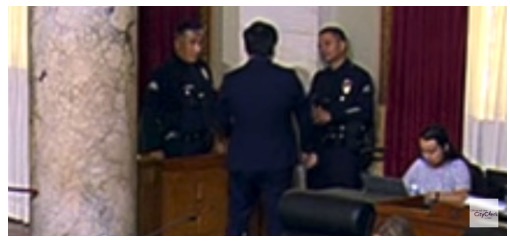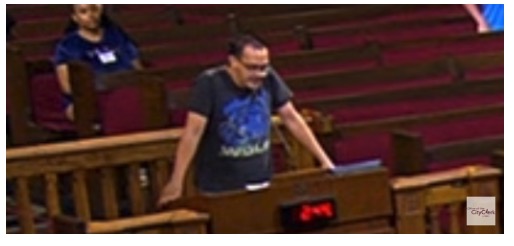Comments
ERIC PREVEN’S NOTEBOOK - If Los Angeles city meetings were a television show, they’d be canceled midseason. Not for low ratings, but because every character is corrupt, the plot never advances, and the viewer is never allowed into the writers' room.
The episodes follow a familiar rhythm: ceremonial scrolls, a few restrained applause breaks, public comments politely dismissed, then off they go into closed session, where governance disappears behind redacted memos and an ever-thickening veil of secrecy. Add in word bans, stunt proclamations, and an increasing number of recesses, and what you’re left with is not a functioning democracy but a scroll-delivery service with light administrative duties.
At this point, City Council meetings should just be held on Nextdoor. Same level of chaos. Slightly more accountability.
Meanwhile, over at the LA County Board of Supervisors, Tuesday’s meeting at Ken Hahn Hall kicked off with the usual invocation, land acknowledgment, and a feel-good scroll for Zorro, a 16-week-old pit bull. Then came the mayhem.
A union protest erupted. Chanting. Sign-waving. Real civic engagement. SEIU members weren’t there for ceremonial flair—they came to demand real answers. Supervisor Horvath did her best, “I’m sorry,” while Chair Barger tried the substitute teacher routine.
“This is our second warning,” she said. “If this continues, we will have to clear the room.”
It continued.
Barger gave the signal. “Clear the boardroom.” Recess declared. Camera feed: off. Live stream replaced with a placeholder screen reading: Meeting has recessed.

We see you...from here!
When things get real—when the public actually shows up—you don’t shut off the camera. That’s not transparency. That’s stagecraft. And it creates exactly the kind of creepy ambiguity that makes people assume the worst. Usually, they’re right.
As for me? I couldn’t make it to Ken Hahn, but I was watching. And I had a few things to say.
Smart Speaker: Eric Preven, Studio City. I’m not SEIU, I'm WGA but I do believe in showing up. And when I saw the feed cut off, I knew exactly what was happening. The room didn’t get too loud—it got too real.
You don’t protect democracy by powering down the record.
And while we’re on the subject of disappearing acts, why do these meetings always begin with a marathon closed session? If there’s an item like 87A—something people care about—why bury it after three hours of legal footnotes? Why not start with the part the public came for?
We don’t like closed sessions. We’re not included. It doesn’t make sense. And frankly, it’s too much.
Later in the meeting, the Board approved a $715,000 grant to the AAPI Equity Alliance. Worthy cause, unclear scope. What’s the deliverable? Is it translation, advocacy, or outreach? Is it just being seen? I’m asking because the public isn’t told.
At the same time, the County has waived roughly 16,000 parking fees—about $60,000 worth—for various events and gatherings. If you’re wondering who gets those perks, join the club. It’s the kind of thing we never see itemized, even though we all pay for it.
It’s not a bribe. It’s not even a benefit. It’s an honorary scroll, awarded to insider motorists in the form of silent parking validation.
If we’re serious about transparency, publish the list. Let Angelenos see who’s parking for free alongside... Sara Sadhwani.
Olympic Fun Zoning:
One item I didn’t get to comment on—because the clock ran out—is the County’s Olympic enthusiasm, specifically the planned fan zones. These Live Sites, as they’re called, are glossy marketing plays with vague community benefit promises. What would Danny Bakewell do? Set up branded Taste of Soul booths, monetize the “fan experience,” and make sure every funnel cake vendor reports to Visa.
The Olympics aren’t coming to celebrate us—they’re coming to lease us.
And then there’s the matter of the patrol boats.
The Board approved three patrol boats for a cost of $660,000. Okay. Boats are boats. But the full line item was $1.26 million. So the obvious question is: where’s the other $600,000 going? Is it custom decals? Fuel? A thousand-dollar ice chest? Do these boats come with a preloaded PR team?
Transparency, once again, capsizes.
Groat Watch:
Now, if we’re talking about municipal dysfunction, no recap is complete without checking in at City Hall, where Groat—the petty tyrant who reads the rules with the zeal of a hall monitor about to write you up for chewing gum—has become a minor celebrity.

Showrunner, Jonathan Groat of the City Attorney's office consults with LAPD stars in a flagging series.
Groat isn’t an elected official. He’s not a policymaker. He’s frequently dead wrong on the Brown Act. But week after week, he sits behind the mic, issuing warnings with the gleam of someone who believes he’s been called to civic greatness.
Groat reads the rules aloud like scripture, improperly marinates the room with his take on what is about to happen, and tosses in awkward Spanish-language advisories while making up the existence of a so-called "randomizer" designed to hand-pick speakers.
He thinks he’s a civil rights educator. He’s actually a mid-tier usher with delusions of grandeur.
Sit down, Groat. You’re not an authority on anything. You’ve tanked the city meeting ratings and probably deserve a raise for that, but don’t give him one. Instead, subject him to a 60-second live call-in assessment from Eric Preven at every meeting for the rest of his life. And for God's sakes, pause so the translator can translate.
This is your first and final warning, Groat.
Handy Dandy Who's Who of Reformers:

Rob Quan, Svengali and Reformer, received special courte$y from the Council Pre$ident.
The Los Angeles County Measure G Governance Reform Task Force was established following the passage of Measure G in November 2024 to propose significant structural reforms to county governance. The task force consists of 13 members: five appointed by County Supervisors, three by labor organizations, and five at-large members selected by the initial eight.
From Supervisor Solis came Brian Calderón Tabatabai, former mayor of West Covina, known for his equity and transparency work, as well as his background in public policy and education. Supervisor Mitchell appointed Derek Steele, Executive Director of the Social Justice Learning Institute, bringing an engineer's systems-thinking approach to equity-driven community development. Bestie Sara Sadhwani, a professor of politics at Pomona College and former state redistricting commissioner, was appointed by Supervisor Horvath. Marcel Rodarte, who heads the California Contract Cities Association, was appointed by Supervisor Hahn, and Supervisor Barger appointed longtime Duarte mayor and Metro board alum John Fasana.
Labor representatives include David Green, President and Executive Director of SEIU 721 and a veteran of LA County's Department of Children and Family Services. Derek Hsieh, representing the Coalition of County Unions and Executive Director of ALADS, brings a combined background in law enforcement and labor relations. Steve Neal, appointed by the LA County Federation of Labor, is a pastor, current Long Beach Harbor Commissioner, and former Long Beach City Councilmember.
The at-large members include Gabriela Gironas, General Manager of Keychange U.S. and founder of the platform 'Cool Shit, Cool People,' known for empowering gender minorities in entertainment. Julia Mockeridge and Rosa Soto were appointed to represent AAPI and unincorporated communities; however, detailed bios have not been disclosed. David Phelps, a former Director of External Relations for the Association of Independent Commercial Producers, has over two decades in public affairs, lobbying for the entertainment sector. Nancy Yap, Executive Director of CAUSE, brings deep AAPI civic engagement and nonprofit leadership experience.
The Los Angeles City Charter Reform Commission was formed in August 2024 and also comprises 13 members. Four were appointed by Mayor Karen Bass: Robert Lewis, who manages community benefits programs at L.A. Care and has nearly three decades in nonprofit work; Raymond Meza, Deputy Chief of Staff at SEIU 721 and veteran labor advocate; Melinda Murray, a Deputy District Attorney and former City Ethics Commissioner; and Christina Sanchez, Vice President of Public Affairs at AltaMed, with a strong record in public health policy.
City Council President Paul Krekorian appointed Mona Field, a professor emerita of political science and former trustee of the L.A. Community College District. He also appointed Ted Stein, whose public background remains undisclosed. Council President Pro Tempore Bob Blumenfield appointed Martin Schlageter, whose background is also undisclosed, and one additional unnamed commissioner.
The remaining five members of the Charter Reform Commission are to be selected by the initial eight. As of now, those selections have not been made public.
Both commissions seek to reimagine the governance of Los Angeles but differ in scope and structure. The County Task Force is more labor-heavy, reflecting Measure G’s labor coalition roots, while the City Charter Commission includes more traditional appointees from political, legal, and nonprofit sectors. The County process has leaned more into inclusion of underrepresented voices and labor experience, while the City's appointments signal a mix of political familiarity and administrative experience, with some opaque selections.
Who picks the members, and why they were picked, should be clear to everyone. That’s the only way people will trust the process. While bios and affiliations have been disclosed for most, several commissioners on both panels have yet to be publicly profiled.
(Eric Preven is a Studio City-based TV writer-producer, award-winning journalist, and longtime community activist who won two landmark open government cases in California.)












